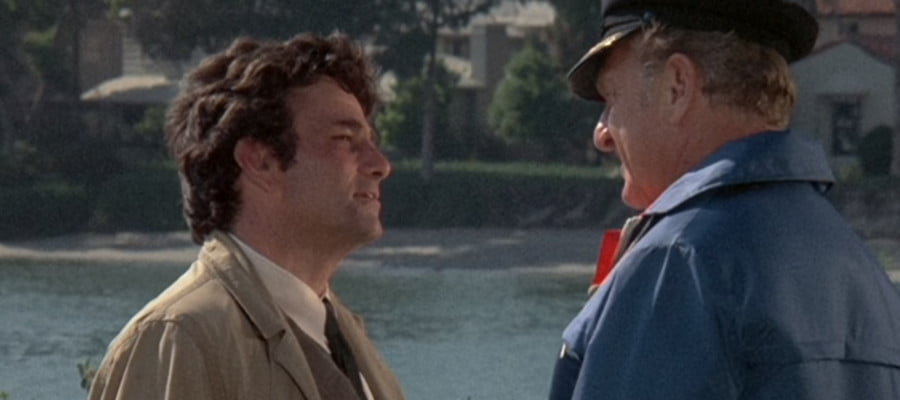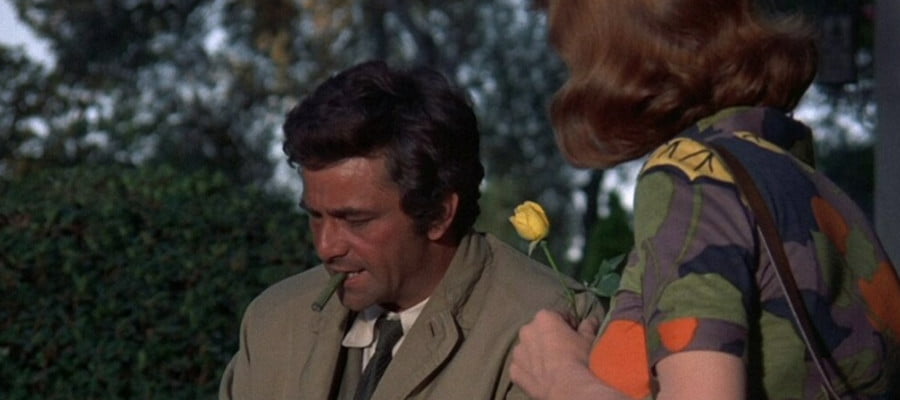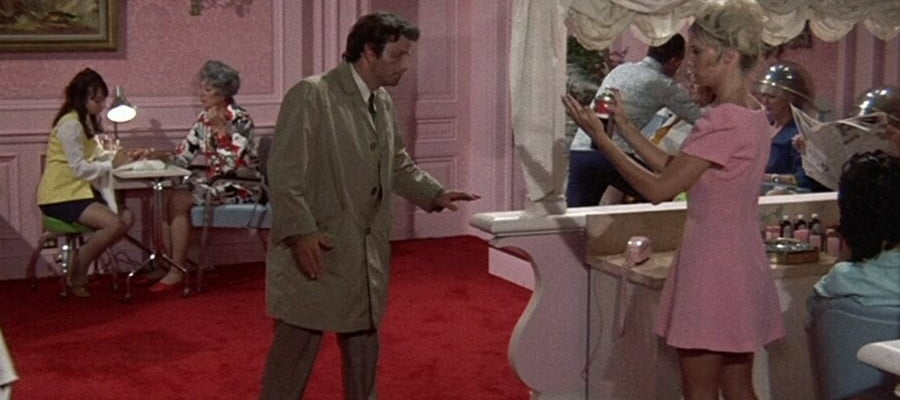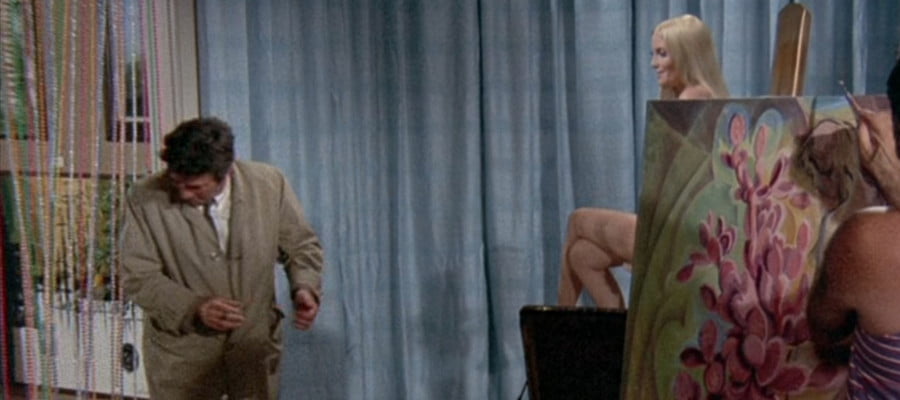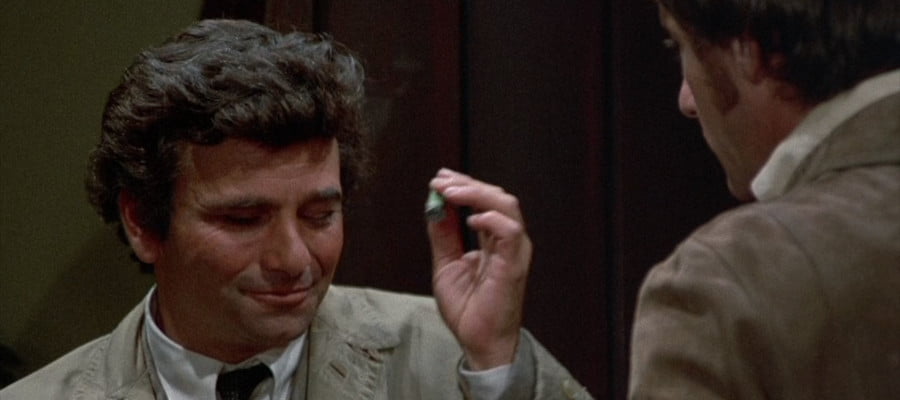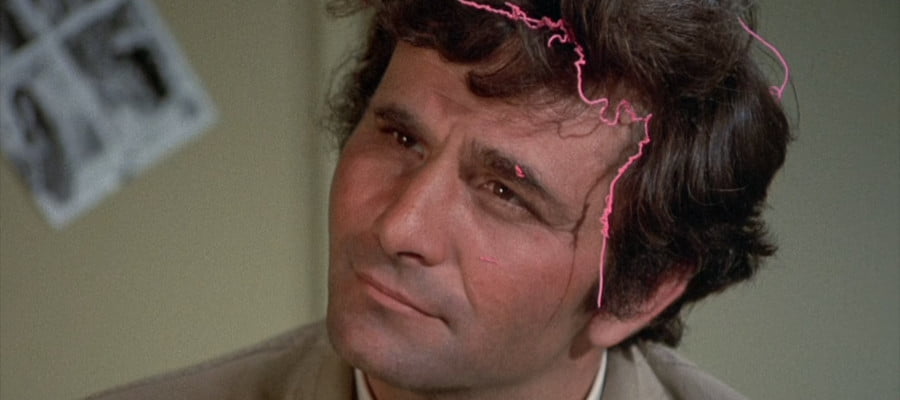Is Columbo, a cop?
And is that copness, itself, inherently transferring the property of being A Bastard?
And how does this apply to the narrative of the media that depicts notorious Short King and Actually Definitely A Police Detective Columbo?
Let us briefly examine the phrase All Cops Are Bastards and its cousin phrases No Really, All Cops and the subsequent phrase Even Whatever Dumb Bastard Cop You’re Related To.
What’s A Columbo?
Let’s get some of the basics out of the way, first. Columbo refers to a series of murder mystery TV movies, and just right here I’ve run out of easy sentences. I could just refer to Columbo as a TV series focusing on the exploits of Lieutenant Detective Columbo, but that’s a simplification. Columbo’s in every one of these movies, but also, the main character of every movie is kind of, instead, the murderer and how they set up their murders and then attempted to get away with them. Episodes aren’t connected to one another meaningfully – sometimes the same actor will show up twice (hi Robert Culp), and even the basic continuity of Columbo’s story gets strange. Don’t worry, we can get into that. Kinda.
Plus, the series was a long runner: The first pilot of Columbo aired in 1968 and the last Columbo episode aired in 2002. Calling a series that lasted that long ‘a TV series’ is one of those understatements that make me wince. Columbo wasn’t a TV series as much as it was television itself for a third of a century. When Columbo first aired, early mysteries included things that Columbo himself needed to be explained to him like telephone answering machines as high-grade tech and metal detectors as specialised police equipment. Photographs are black and white and grainy and nobody has surveillance equipment. When the last Columbo aired, the character could reasonably expect his fellow officers to have Blackberries.
The recurrent character through all these stories is Columbo, no first name offered, played by Peter Falk, and Columbo is… weird. He is offputting. He speaks about his own mind in a way that I think would read really clearly as neurodivergent these days, he gives long, strange, rambling narratives about his childhood, his friends, his wife, and sometimes it’s obviously conflicting stuff, sometimes it’s not.
The central storytelling structure of Columbo is pretty simple: Someone commits a murder, and we, the viewers, are fully aware of how. We are given all the information present in the story about how this murder was executed, and almost all the information that connects to it. These murders are almost always done in ways that make deducing how they happened difficult, and in many cases, have information that reasonably could throw police off the scent and into a frame-up. The puzzle that ensues then is Columbo investigating the information that’s available to him and work out what actually happened.
What’s great about these mysteries and which betrays a very different character to more modern mystery stories is that by starting with the person you know is the murderer and where you know how they hid the evidence, you only really see the story as it focuses on that person as a possible suspect. It’s not like a CSI style mystery story, where you’re constantly introducing new directions, potential new suspects – you know where the story needs to end up, and the question instead becomes ‘how can you reasonably interpret this information to find the truth?’
What this typically means is finding incongruities. It’s very, very rarely about understanding a character, about Columbo being able to soul-read someone as a liar or deceitful. It’s almost always about someone telling him a lie that doesn’t match up to reality, or someone not respecting his ability to understand complex topics.
That’s kind of it, then. The core of Columbo as a story is watching Columbo as a character just work his way through puzzles presented by people who have committed a murder and who are convinced they can get away with it. It’s also really consistent with its murderers and victims, too: While some victims are kind of jerks or maybe rude, overwhelmingly, the murderers of Columbo are utter pricks, who, whether openly or secretly, are smugly convinced they are entitled to getting away with their crime.
That’s your basic parameters on a Columbo. Now let’s get into the nit and or grit.
what does ‘acab’ mean?
Well, it means ‘all cops are bastards.’ That’s your acronym unpacked, and there, we’re done. But hang on, I’m getting paid by the word here (I am not getting paid by the word) and am I not going to be satisfied until I’ve actually explained it. At least, explained it as I mean it.
The phrase, as I learned it, is pretty simple; it’s about how you can’t trust any cops, because any individual cop is going to report to and trust other cops, and since the best cop is still on the same team with the worst cop, you have to assume that the worst cop is the one who gets to determine what happens to you. Like, all it takes is one bad cop to know your address to lose all security, all it takes is one bad cop to attack you personally in an unaccountable way. Good cops don’t control bad cops. So, you have to act as if all cops are bastards, and then, you find, they see this position as unreasonable, and justify it. After all, if you don’t trust good cops, those good cops real quickly show that they weren’t good cops. Wild!
It’s not personal. It’s just pragmatically true: All cops are cops, and cops are bastards, so tautologically, all cops are bastards. You might know a nice cop, a cop you’re related to, a cop who’s kind and sweet, but that doesn’t stop them being a cop, and all cops are bastards.
Like, the cop who’s nice to me is a cop who isn’t going to do anything to stop other cops from putting spit hoods on black kids, so what fucking good is his being nice? What value civility over the actual fundamental purpose of ‘the police’ as an entity? When people make arguments against cops being bad, the arguments tend to take some form of but I have a good experience with a cop, and that’s great, that’s really cool – but just like with Catholic priests, the best of them don’t do anything that any good person can’t or won’t do, and the worst of them are given power by the organisation they belong to, and that power demands it be unaccountable.
It’s like ‘don’t talk to the police.’ It doesn’t matter about how things should be, it’s just very clearly true how it is: There’s no reason for you, for your safety, for your best interests to ever talk to the police.
Cops are bad, then, yeah?
Why do we keep seeing cops in movie and TV being like, good, you ask, rhetorically as an incredibly naive device? Well, let me explain.
Copaganda
There is literally a concentrated, police-driven movement to represent police as heroic in media.
That’s not a joke, that’s not a hyperbole. During the 1950s, police were directly distressed by their representation in media, and dedicated resources to changing the way TV shows and movies presented them. They dedicated resources to enabling television and movies, and as a result, making pro-cop media was easier, and that created a market bubble and now it’s a genre, and it’s a genre that rewards and enables extremely entrenched people who are very loyal to the idea space, and now we have an entire industry dedicated to this.
Like there’s a Chicago Police Department tv series that conspicuously, doesn’t mention the multiple black sites the Chicago Police Department have.
I am not in a position to really give you an in-depth vision of what copaganda is. It’s a well-known subject, and one that a variety of different internet sources have already covered. It’s one of those things where you don’t need to really establish or prove anything about it, to anyone who’s already reasonably aware of the realities of the world. Hey, TV cops represent the jobs of cops in a really unrealistic way and people are more likely to think of fictional cops than real statistics, bam. You don’t need to really embellish that point, unless someone is being stubborn and demanding you prove it.
There’s this idea in the essay invisible bullets, where you can use media to present ideas as if it’s a fight between two positions, both of which accept some precept you want accepted, and people getting involved in that fight means that they unconsciously start to accept that precept.
An example is that in Shakespeares’ Henriad plays, you can see the presentation of the kings as either a testament to how good those kings were because they agonised about their positions (heavy is the head that wears the crown), or how bad those kings were and therefore it was good that they were replaced by better kings (even kings may fall). Both sides of that conversation however, require the idea of a king to be a good thing, and by getting people into that argument,you’ve got them to accept the idea. This is something you can look to as an idea connected to recuperation – the process where a dominant power structure turns countercultural ideas into ideas that reinforce that dominant structure.
If you do want someone to step you through both what Copaganda is and how it lines up with statistics, and presents it in a way where they can just show you cop shows, you can see a long-form piece on it over at Skip Intro. It’s a good take because you can see the way that copaganda grows from a central point, and how you can still have good stories that work around this space, even if they’re not necessarily working within that same space of ‘gee wow cops are great.’
The purpose of copaganda, then, is to take the police, and represent them as a fundamental good, and to justify the prominence they have, in the space of our society. This is obviously at odds with our existing idea of All Cops Are Bastards because, you know, these shows tend to present that there’s maybe A Cop’s A Bastard, and once we deal with him well that’s that sorted out.
Where Does Columbo Fit?
Does this make Columbo the series, copaganda? Does it make Columbo, the character, A Bastards? Well, in the simplest sense, yeah, he’s just an extension of the existing landscape of media which presents the police as an unvarnished good, and while there are definitely examples of ways in which Columbo resists the police, or is resisted by the police, he’s still presented as a cop. Therefore, if we recognise that copaganda is a thing, and all cops are bastards, then… yeah. Seems pretty done and dusted.
Well that’s that then, time to throw out our expensive DVD box sets of Columbo right? After all, it’s a cop show for coppy cops who cop coply, how could we tolerate it?
Well, first there’s nothing wrong with liking shows because they’re part of a trend of pernicious media that’s designed to privilege an oppressive class. Because like, if you do want to cut out media like that, I have some bad news for you about literally everything down to things like hammers and sandwiches.
But let’s talk about that recuperation idea. Because Columbo is absolutely a cop and Columbo is absolutely copaganda, but I think there’s an important message here as well:
Columbo is a representation of cops, not as they actually are, but it’s an idealised representation of what cops should be.
Columbo doesn’t bother sex workers. He doesn’t arrest petty criminals. He leaves a lot of people alone, because they’re not hurting anyone and he doesn’t care. There’s even a point where he tells a woman how to hide evidence from him in a public space, and then tells her to not talk to him about anything she does without an attorney.
Columbo is presented as a fantasy of what a cop should be. The thing that pulls his attention is always powerful people killing people, for convenience or frustration or rage. And those people will often deflect onto someone else, someone outside their class, someone who is marginalised in some way, and Columbo isn’t here for that. There are so many simple, easy, convenient explanations for the murders presented to the cops, and Columbo makes a point of ignoring them until he can satisfy all the details of the case.
That is, Columbo cares about doing the job he’s meant to do.
Columbo’s not a cop, he’s a fucking faerie spirit. He’s a walking avatar for the ideal of what an actual community-driven policing service could manage. Despite being a lieutenant, he’s working class, he’s poor, he’s always looking like a rumpled hat, and he talks about supporting family members with what money he does get. He’s got a childhood of criminal behaviour, but he’s still able to do what he can to address crimes – but he does it by finding the rich, the powerful, the people who think – reasonably – that they are beyond consequence and showing them they’re wrong. And this is despite being largely nonviolent, refusing the use of guns and coercion, and honestly, probably neurodivergent, if he even fucking exists.
Columbo’s not a cop.
He’s what cops wish they could fucking be.
Oh and I really like Columbo, but I do recommend stealing it. But I would, wouldn’t I?
